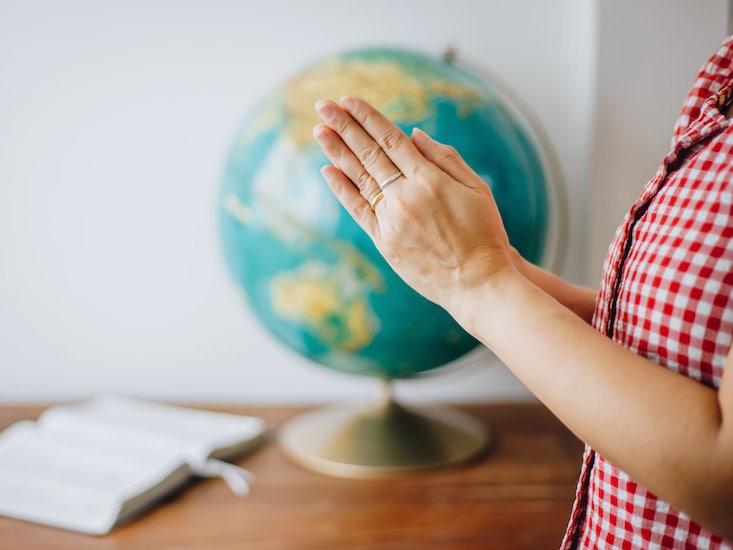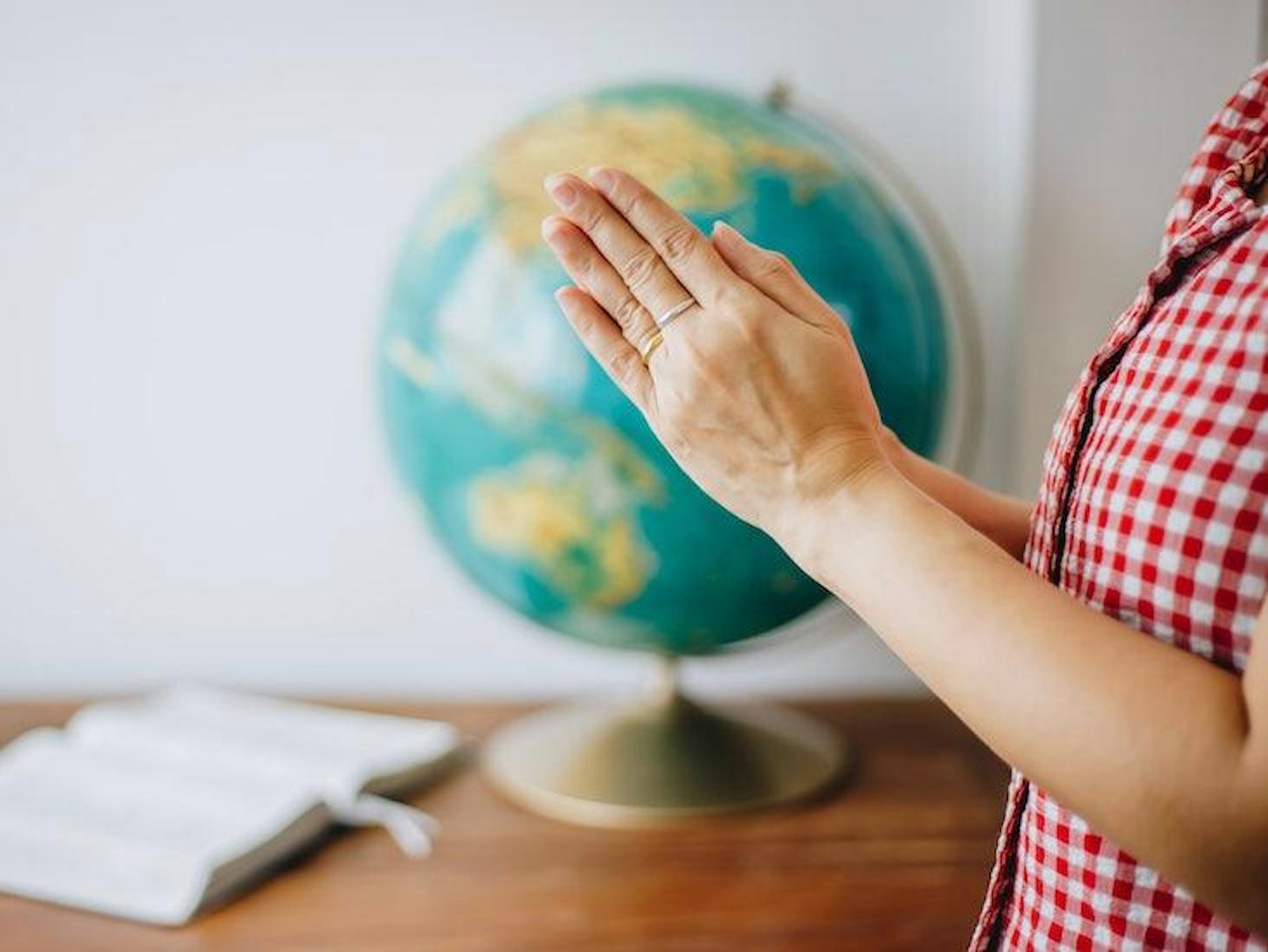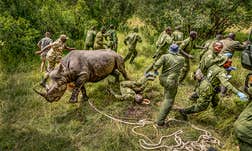
In a recent viral news segment on CNN, cars are shown exiting what a narrator says is a church parking lot—dozens of people, including children, had just attended an evening service. A reporter asks a woman in her car why, when the COVID-19 pandemic has convinced many to stay home, she went anyway. “I wouldn’t be anywhere else,” she says. The reporter follows up, “Aren’t you worried”—here the woman begins shaking her head—“that you could infect other people if you get sick inside?” “No,” she says. “I’m covered in Jesus’ blood.” As a result, she added, being infected when shopping isn’t scary or nerve-wracking.
Religion is an important way people cope with catastrophes. It has been shown that people are more religiously active in the wake of crises. In a 2017 study, Philipp Ager and Antonio Ciccone found that religious participation increases with the risk of destructive rainfall;1 Emmanuelle Auriol and his colleagues likewise found, in a 2017 study, that people donate more to churches in the event of catastrophes, mainly as a form of insurance—the idea being that, should circumstances become dire, the donations would increase the odds of the divine intervening on their behalf.2
More recently, in a 2019 study, Jeanet Bentzen found that when struck by catastrophe, people seek closeness to God and pray more often.3 In a new paper, consistent with these findings, Bentzen reports recent evidence showing that religiosity has increased during this global crisis.4 Naturally, this means that people might feel a particularly strong need for their church community. Yet, with large gatherings of people being strongly discouraged, many religious leaders have moved their services online, or are careful to maintain social distance when welcoming people into their churches.
Christians who prayed for hurricane victims donated less than Christians who did not pray for the victims.
It makes sense that people pray more when dealing with major catastrophes. Prayer has been shown to benefit mental health.5,6 For people of faith, prayers can be part of important self-care, helping people to deal with the challenges the COVID-19 pandemic poses to mental well-being, such as anxiety caused by fear for one’s health and that of loved ones, or depression and anxiety from the self-isolation measures many countries have either recommended or enforced.
Prayers can also give people a sense of purpose and guidance in difficult times. Many doctors and nurses, during moments they can spare away from the stress of treating patients, are retreating to their hospital rooftops and helipads to pray together. Religious Christians (the majority of Americans) also value receiving prayers from others. In a recent study, my collaborator Shiri Noy and I found that Christians, in the wake of personal hardship, are willing to give up monetary support in return for knowing that Christian strangers will pray for them.7
But there is another side to prayer, particularly when it is trumpeted in the public arena. In March, President Trump tweeted, “We are a Country that, throughout our history, has looked to God for protection and strength in times like these….” He declared March 15 a National Day of Prayer. On March 28, Mississippi Gov. Tate Reeves wrote on his Facebook page, “I believe in the power of prayer. I believe God is in control as the Bible teaches us.” Reeves waited until April 3 to instigate a state shelter-in-place order.
In public policy, prayers are risky. Prayers to God can give people a false sense of reassurance that something has been done. In the context of COVID-19, this could mean actions to control the virus or protect those on the front lines of the pandemic—the health care workers, fire fighters, and store clerks, among others. In the worst case, prayers can take the place of effective action, such as social distancing and material aid, which can prevent people from becoming sick and dying.
In a recent study, I found that prayers for strangers may displace material aid in the wake of a natural disaster.8 In two out of three studies, I found that Christians who prayed for hurricane victims donated less than Christians who did not pray for the victims. While it is unknown how prayers affect other forms of support during a pandemic, it is a real risk that they have similar effects, given that the same social and psychological mechanisms may be at play. In my research, I found that prayers may take the place of material help in the wake of a natural disaster because religious Christians regard the act of praying itself to be directly helpful—hurricane victims’ material need was perceived as lower, after they had first received prayers.
Further, prayers from strangers are valued only by those who share the strangers’ Christianity. (It is unknown if people similarly value prayers from other religious denominations.) My collaborator and I found that the well-being of atheists and agnostics decreases if informed that Christian strangers pray for them. Atheists and agnostics were even willing to pay money to avoid being prayed for. Ultimately, research shows that, during a social catastrophe, religion can promote prosocial behavior and prayer can offer comfort to people. But it also demonstrates that prayer risks interfering with public efforts aimed at controlling a crisis and alleviating people from its harmful effects.
Linda Helena Thunstrom is an assistant professor in the Department of Economics at University of Wyoming.
References
1. Ager, P., & Ciccone, A. Agricultural risk and the spread of religious communities. Journal of the European Economic Association 16 1021-1068 (2017)
2. Auriol, E., Lassebie, J., Panin, A., Raiber, E., & Seabright, P. God insures those who pay? Formal insurance and religious offerings in Ghana (No. 17-831). Toulouse School of Economics (2017)
3. Sinding Bentzen, J. Acts of God? Religiosity and natural disasters across subnational world districts. The Economic Journal, 129 2295-2321 (2019)
4. Sinding Bentzen, J. In crisis, we pray: Religiosity and the COVID-19 pandemic. Manuscript, https://www.dropbox.com/s/jc8vcx8qqdb84gn/Bentzen_religiosity_covid.pdf?dl=0 (2020)
5. Maltby, J., Lewis, C. A., & Day, L. Religious orientation and psychological well-being: The role of the frequency of personal prayer. British Journal of Health Psychology 4 363–378 (1999)
6. Meisenhelder, J. B., & Chandler, E. N. Frequency of prayer and functional health in Presbyterian pastors. Journal for the Scientific Study of Religion 40 323–329 (2001)
7. Thunström, L. & Noy, S. The value of thoughts and prayers, Proceedings of the National Academy of Sciences, 116 19797-19798 (2019)
8. Thunström, L. Thoughts and prayers—Do they crowd out charity donations? Journal of Risk and Uncertainty 1-28. doi.org/10.1007/s11166-020-09322-9 (2020)


























